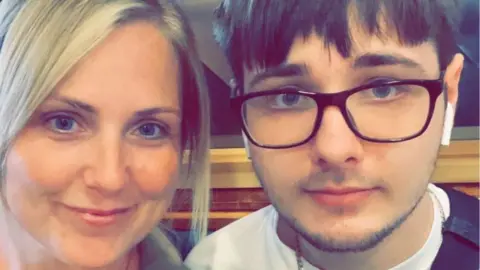Arrests over supply of drugs linked to man's death
 Family handout
Family handoutTwo people have been arrested in a police raid targeting the supply of synthetic opioids which a force believes were connected to a man's death.
Harry Durose, who had autism and learning difficulties, was found dead in his supported accommodation in Tameside, Greater Manchester, on 2 March.
Greater Manchester Police (GMP) said officers were waiting for the results of toxicology test results, but it was believed the 21-year-old had taken a substance containing nitazenes, which he had believed was diazepam.
The force said the synthetic opioid was found in Mr Durose's flat and subsequent inquiries had led officers to an industrial unit on Tay Road, Birmingham, where about 22lb (10kg) of the Class A drug was seized.
'Didn't see the dangers'
A GMP representative said the 34-year-old man and 31-year-old woman were arrested on Fox Hill and Rough Road in the West Midlands city and were being held on suspicion of conspiracy to supply controlled drugs
They said it was the force's first warrant executed since nitazenes were classified as a Class A drug in March.
Speaking to BBC North West Tonight in March, Mr Durose's mother Amy said her son had been prescribed diazepam for a chronic condition called hypermobility, which can cause pain and stiffness in joints and muscles.
She said she believed that after her son's doctor cancelled his prescription, he had tried to buy the drug himself on the black market as he "struggled to sleep with his pain in his legs".
"He didn't see the dangers in asking somebody other than his doctor for it," she said.
She added that her son had "wanted his independence" and had only moved out of the family home in Denton a couple of weeks before he died.
Det Supt Joe Harrop said while the investigation was linked to the drugs found in Mr Durose's flat, it also formed part of a wider crackdown on the synthetic opioids.
"I want to reassure people that tackling drug supply continues to be incredibly important for us, and doesn’t stop at the Greater Manchester borders," he said.
Listen to the best of BBC Radio Manchester on Sounds and follow BBC Manchester on Facebook, X, and Instagram. You can also send story ideas to [email protected]
